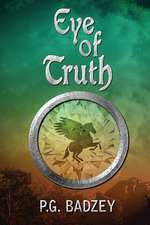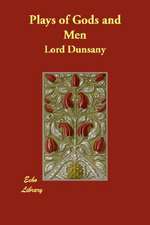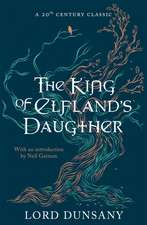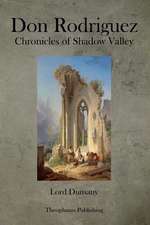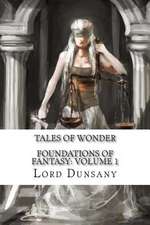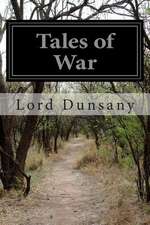In the Land of Time and Other Fantasy Tales: Penguin Classics
Autor Edward John Moreton Dunsany Editat de S. T. Joshien Limba Engleză Paperback – 31 ian 2004 – vârsta de la 18 ani
A pioneer in the realm of imaginative literature, Lord Dunsany has gained a cult following for his influence on modern fantasy literature, including such authors as J.R.R. Tolkien and H. P. Lovecraft. This unique collection of short stories ranges over five decades of work. Liberal selections of earlier tales—including the entire Gods of Pegana as well as such notable works as "Idle Days of the Yann" and "The Fortress Unvanquishable, Save for Sacnoth"—are followed by memorable later tales, including several about the garrulous traveler Joseph Jorkens and the outrageous murder tale "The Two Bottles of Relish." Throughout, the stories are united by Dunsany's cosmic vision, his impeccable and mellifluous prose, and his distinctively Irish sense of whimsy.
- First time in Penguin Classics
- The only annotated edition of Dunsany's short stories
Din seria Penguin Classics
-
 Preț: 81.00 lei
Preț: 81.00 lei -
 Preț: 103.12 lei
Preț: 103.12 lei -
 Preț: 94.66 lei
Preț: 94.66 lei -
 Preț: 100.22 lei
Preț: 100.22 lei -
 Preț: 129.73 lei
Preț: 129.73 lei -
 Preț: 103.53 lei
Preț: 103.53 lei -
 Preț: 80.44 lei
Preț: 80.44 lei -
 Preț: 76.28 lei
Preț: 76.28 lei -
 Preț: 100.83 lei
Preț: 100.83 lei -
 Preț: 67.61 lei
Preț: 67.61 lei -
 Preț: 119.60 lei
Preț: 119.60 lei -
 Preț: 95.29 lei
Preț: 95.29 lei -
 Preț: 119.20 lei
Preț: 119.20 lei -
 Preț: 74.21 lei
Preț: 74.21 lei -
 Preț: 89.29 lei
Preț: 89.29 lei -
 Preț: 101.17 lei
Preț: 101.17 lei -
 Preț: 133.62 lei
Preț: 133.62 lei -
 Preț: 77.15 lei
Preț: 77.15 lei -
 Preț: 110.75 lei
Preț: 110.75 lei -
 Preț: 87.86 lei
Preț: 87.86 lei -
 Preț: 81.03 lei
Preț: 81.03 lei -
 Preț: 78.77 lei
Preț: 78.77 lei -
 Preț: 135.25 lei
Preț: 135.25 lei -
 Preț: 92.40 lei
Preț: 92.40 lei -
 Preț: 95.29 lei
Preț: 95.29 lei -
 Preț: 88.86 lei
Preț: 88.86 lei -
 Preț: 102.21 lei
Preț: 102.21 lei -
 Preț: 110.15 lei
Preț: 110.15 lei -
 Preț: 119.53 lei
Preț: 119.53 lei -
 Preț: 64.54 lei
Preț: 64.54 lei -
 Preț: 82.89 lei
Preț: 82.89 lei -
 Preț: 64.54 lei
Preț: 64.54 lei -
 Preț: 107.67 lei
Preț: 107.67 lei -
 Preț: 93.84 lei
Preț: 93.84 lei -
 Preț: 96.30 lei
Preț: 96.30 lei -
 Preț: 90.11 lei
Preț: 90.11 lei -
 Preț: 113.78 lei
Preț: 113.78 lei -
 Preț: 75.15 lei
Preț: 75.15 lei -
 Preț: 132.76 lei
Preț: 132.76 lei -
 Preț: 87.86 lei
Preț: 87.86 lei -
 Preț: 75.87 lei
Preț: 75.87 lei -
 Preț: 135.89 lei
Preț: 135.89 lei -
 Preț: 95.29 lei
Preț: 95.29 lei -
 Preț: 105.58 lei
Preț: 105.58 lei -
 Preț: 93.43 lei
Preț: 93.43 lei -
 Preț: 112.74 lei
Preț: 112.74 lei -
 Preț: 96.30 lei
Preț: 96.30 lei -
 Preț: 90.73 lei
Preț: 90.73 lei -
 Preț: 88.04 lei
Preț: 88.04 lei
Preț: 100.83 lei
Nou
Puncte Express: 151
Preț estimativ în valută:
19.30€ • 20.07$ • 16.15£
19.30€ • 20.07$ • 16.15£
Carte disponibilă
Livrare economică 22 februarie-08 martie
Preluare comenzi: 021 569.72.76
Specificații
ISBN-13: 9780142437766
ISBN-10: 014243776X
Pagini: 400
Dimensiuni: 127 x 196 x 25 mm
Greutate: 0.34 kg
Editura: Penguin Books
Seria Penguin Classics
ISBN-10: 014243776X
Pagini: 400
Dimensiuni: 127 x 196 x 25 mm
Greutate: 0.34 kg
Editura: Penguin Books
Seria Penguin Classics
Cuprins
Introduction
Suggestions for Further Reading
A Note on the Text
I. Pegana and Environs
The Gods of Pegana
Time and the Gods
A Legend of the Dawn
In the Land of Time
The Relenting of Sardinac
The Fall of Babbulkund
II. Tales of Wonder
The Sword of Welleran
The Kith of the Elf-Folk
The Ghosts
The Fortress Unvanquishable, Save for Sacnoth
Blagdaross
Idle Days on the Yann
A Shop in Go-by Street
The Avenger of Perdónaris
The Bride of the Man-Horse
III. Prose Poems
Where the Tides Ebb and Flow
The Raft-Builders
The Prayer of the Flowers
The Workman
Charon
Carcassonne
Roses
The City
IV. Fantasy and Reality
The Wonderful Window
The Coronation of Mr. Thomas Shap
The City on Mallington Moor
The Bureau d'Echange de Maux
The Exile's Club
Thirteen at Table
The Last Dream of Bwona Khubla
V. Jorkens
The Tale of the Abu Laheeb
Our Distant Cousins
The Walk to Lingham
The Development of the Rillswood Estate
A Life's Work
VI. Some Late Tales
The Policeman's Prophecy
The Two Bottles of Relish
The Cut
Poseidon
Helping the Fairies
The Romance of His Life
The Pirate of the Round Pond
Explanatory Notes
Suggestions for Further Reading
A Note on the Text
I. Pegana and Environs
The Gods of Pegana
Time and the Gods
A Legend of the Dawn
In the Land of Time
The Relenting of Sardinac
The Fall of Babbulkund
II. Tales of Wonder
The Sword of Welleran
The Kith of the Elf-Folk
The Ghosts
The Fortress Unvanquishable, Save for Sacnoth
Blagdaross
Idle Days on the Yann
A Shop in Go-by Street
The Avenger of Perdónaris
The Bride of the Man-Horse
III. Prose Poems
Where the Tides Ebb and Flow
The Raft-Builders
The Prayer of the Flowers
The Workman
Charon
Carcassonne
Roses
The City
IV. Fantasy and Reality
The Wonderful Window
The Coronation of Mr. Thomas Shap
The City on Mallington Moor
The Bureau d'Echange de Maux
The Exile's Club
Thirteen at Table
The Last Dream of Bwona Khubla
V. Jorkens
The Tale of the Abu Laheeb
Our Distant Cousins
The Walk to Lingham
The Development of the Rillswood Estate
A Life's Work
VI. Some Late Tales
The Policeman's Prophecy
The Two Bottles of Relish
The Cut
Poseidon
Helping the Fairies
The Romance of His Life
The Pirate of the Round Pond
Explanatory Notes
Recenzii
"Dunsany's best stories remain unique: nobody else has ever been able to capture his visions....S.T. Joshi, a biographer of Dunsany and an expert in the Weird, has given us an excellent introduction and notes." —Ursula K. Le Guin, Los Angeles Times Book Review
Extras
Helping the Fairies
The young journalist from London on holiday at Rathgeel was feeling lonely for want of news. There was plenty of fishing and shooting, but no news; for nothing in Rathgeel ever seemed to happen. The weather may have changed a bit at times in Rath geel, but not while he was there; the wind blew warm and damp from the south-west all the time, and all the thorn trees sloped the same way, as though that one wind had been blowing for ever.
And the odd thing was, as it seemed to Draffin, the young journalist I have mentioned, nobody seemed to want anything new to happen; they complained a bit while they were talking of the weather and the crops, the price of cattle and one or two other things, but they never seemed in their hearts to want anything new. And Draffin was lonely and homesick for want of news, good as the fishing was, and the shooting too.
And then one day a man called William Smith was found ly ing dead in a narrow old sunken lane, where nobody went but an odd tramp, and he had been lying there nearly a week when they found him, and there were some bullet-holes in him.
This was like dawn to Draffin after a long night. News at last! And he ran round, with his notebook open in his hand, to all the acquaintances that he had made during his holiday, to get the details of it. And nothing could he get.
“I thought the Irish were a talkative people,” he said to one of them at last, a tall, dark, thin man called Michael Heggarty.
“And so we are,” said Heggarty.
“I think you are the dumbest people in the whole world,” said Draffin. “And that's not excepting the people in deaf-and-dumb asylums.”
“Is that so?” said Heggarty.
“I am sure it is,” replied Draffin.
“Maybe that's because you don't use the right key,” said Heggarty. “You would not say there was no money in the Bank of England because you couldn't open the vaults. But there's a key to them.”
“What's the key here?” asked Draffin.
“Sure, it's whiskey,” said Heggarty, “if you can find the right man for it.”
“And who's the right man?” asked Draffin.
“Ah, I'd not like to be telling you,” said Heggarty.
“Well, one must make a beginning,” said Draffin, “so I'll be gin by trying you, if you wouldn't mind coming in here.” For they were standing outside the white wall of Jimmy Doyle's public-house, under its dark thatch.
And they went inside and whiskey was ordered by Draffin and drunk by them both, sitting together at a table, and the heavy silence continued. And Draffin paid for more whiskey, and that was drunk too. And in the few minutes that went by af ter that the little room seemed to grow darker in the autumn after noon, but a light was growing in the eyes of Heggarty. And then Draffin said half to himself and half to the far wall at which he was gazing, “I wonder what happened to William Smith.”
“I'll tell you,” said Heggarty. “It was like this. He comes over here from England, or from some place where they must be very ignorant, about a year ago, and he buys a bit of land to do some farming, and he settles down all alone in the farm house on it. I wouldn't say he didn't understand farming, but he was terrible ignorant of the land and all the ways of it. And there was a lone thorn in a field that he wanted to plough, an old thorn, what was left of it by the ages, and he said it would get in the way of the plough.
“There was no harm in ploughing the field, but it stands to reason he could have run a plough round the tree, and by bend ing his head a bit he could have got under the branches, and the horse too, for a horse would have had more sense than what he had. But he couldn't see that, and he must cut down the tree, a lone thorn of the fairies, one that the Little People had danced round for ages.
“Well, he asks several young men to cut it, but none of them would do anything so foolish and made various excuses. So what does he do but he gets an axe and he cuts it down himself. And nobody says a word at first. We was all too horrified. And then some of us goes to old Timmy Maguire to hear what he will say. And we tells him what William Smith has done, and he had heard already, and old Timmy Maguire says, 'No matter. You only have to wait. Watch him and wait and see what the Little People will do. For I never knew anybody do anything agin them without they being revenged on him; never yet, and I've lived to be ninety.'
“Well, that satisfied all of us, except one young fellow who must always be asking questions.
“What'll they do to him?' he says.
“You have only to watch,' says old Timmy Maguire. 'They will take his luck away. Watch his luck and see what happens to it. I never knew the Little People leave a man's luck when he had offended them, not a shred of it. I never saw them do that in ninety years.'
“And did you often see them at it?' asks the young fellow.
“Begob,' says old Timmy Maguire, 'many's the time I seen them take all a man's luck right away to the mountains, nor I never seen it come back.'
“'Sure, that's terrible,' says one of us.
“It's what they do,' says old Timmy Maguire.
“Well, we all decides to do what old Timmy Maguire says, and to watch the luck of William Smith and to see what hap pens to it; and what happens is this: it's the most extraordinary part of my story, but it's the truth I'm telling you. William Smith puts five pounds on a horse a few days later that's run ning at a hundred to one. Well, that's tempting your luck to leave you; no horse is going to win at a hundred to one, and it's throwing five pounds away, and a man who begins like that will throw everything away. But this horse wins and the bookie pays and we all says, 'What about the Little People?'
“And that isn't all. There's a competition next week to guess the number of rabbits that there are in County Meath, with a motor-car for a prize for the man whose guess is nearest. And William Smith guesses the right number within three, and he gets the motor-car. And the Little People says nothing.
“And it doesn't stop there. For a few days later he sells a horse for a thousand pounds what he had bought out of a cart for twenty-five pounds, either knowing something about a horse or finding a man that thought he did; but it was luck ei ther way. Ay, out of a cart, and he sells it for a thousand pounds. And that wasn't all, nor nearly all, but I won't weary you with telling you all of it, and maybe you wouldn't believe me if I did; but he had a run of luck such as no one ever saw, and it went on week after week, and was an insult to those that dance under the moon.
“And we goes to old Timmy Maguire and says, 'What about it now?' And he says, 'Only wait.' And that man Smith's run of luck went on and on. And then he backs another horse in a race and it was three to one on, and he puts on six hundred pounds to win two hundred; and he could afford to do that when he knew that he couldn't lose. And it was just the same as the horse at a hundred to one, and he gets two hundred pounds.
“Well, that was the limit, and something had to be done. It was no use asking old Timmy Maguire, who would say noth ing but 'Wait' or 'Watch him.' We had to do something our selves. I had nothing to do with it myself, because I have always kept away from religion and politics and all them kind of things, and I says to the rest of the boys, 'I'll have no hand in it'; and they says, 'Sure, we all respect your principles. At the same time the Little People are being insulted by this man's luck, as though they didn't exist, or as though there were noth ing sacred in their old thorns, and we can't allow that kind of thing in a place like Rathgeel.' And I had to agree that that was so: what else could I say? Though I took no part in it myself.
“Well, when the boys was gone I goes once more to old Timmy Maguire to tell him that the young lads is getting impatient. 'Sure, they needn't be,' says he. 'For I never knew any man to hold his luck against that people, and they'll be avenged for their thorn.'
“It was no use telling him of all the good luck that was con tinually coming to William Smith, for he wouldn't listen, but only-says to me, 'Wait.'
“Well, the young lads goes that night to the house of William Smith, and they finds him sitting at a table totting up the figures of all the money that had been coming his way ever since he cut down the old thorn, and there was little smiles on his face. That is what the boys told me afterwards, and I only tell you what they told me, but I can't say exactly what happened when I wasn't there myself, but was at home with my poor old mother who had a cold and wanted me to look after her.
“But the young lads came to William Smith and say to him, 'Rathgeel was always a quiet place, where no one takes any part in religion or politics and never interferes with anyone, whatever his religion is. At the same time,' they says, 'if anyone thinks that they can come here from England and buy a farm and insult those that dance round the thorn, and make money that many a man would be glad of with an old mother to sup port, as though his luck hadn't changed and the Little People didn't exist, is greatly mistaken, as you'll soon find out if you don't give up all the money you've made since you desecrated the thorn, and a great deal more besides, till you've given up to fellows that will know how to use it properly, as much as you would have lost if your luck had turned against you weeks ago, as it should; if you know what we mean, and if you don't it's a bullet you'll get, which may help to teach you.'
“That's what the young lads told me they said to him. And William Smith says nothing, and they sees he is in two minds what to do; and Rathgeel being a quiet place, as I told you and as you've seen for yourself, where no trouble of any sort ever occurred, and they not wanting its name to become a byword from having a man there that was insulting the Little People and growing fat on it, and interfering with their dancing at night, for a lone thorn is their ballroom, they asks him to step outside with them, before he can make up his mind for fear he would make it up wrong. And they takes him to that bohereen where the body was found, and what happened there they none of them told me, so there's no knowing, and it's no use any man saying there is.
“But they goes to old Timmy Maguire and tells him that William Smith is dead, and what ought they to do now? And old Timmy Maguire says, 'Sure, there's nothing more for any body to do. Didn't I tell you that all you had to do was wait?”
The young journalist from London on holiday at Rathgeel was feeling lonely for want of news. There was plenty of fishing and shooting, but no news; for nothing in Rathgeel ever seemed to happen. The weather may have changed a bit at times in Rath geel, but not while he was there; the wind blew warm and damp from the south-west all the time, and all the thorn trees sloped the same way, as though that one wind had been blowing for ever.
And the odd thing was, as it seemed to Draffin, the young journalist I have mentioned, nobody seemed to want anything new to happen; they complained a bit while they were talking of the weather and the crops, the price of cattle and one or two other things, but they never seemed in their hearts to want anything new. And Draffin was lonely and homesick for want of news, good as the fishing was, and the shooting too.
And then one day a man called William Smith was found ly ing dead in a narrow old sunken lane, where nobody went but an odd tramp, and he had been lying there nearly a week when they found him, and there were some bullet-holes in him.
This was like dawn to Draffin after a long night. News at last! And he ran round, with his notebook open in his hand, to all the acquaintances that he had made during his holiday, to get the details of it. And nothing could he get.
“I thought the Irish were a talkative people,” he said to one of them at last, a tall, dark, thin man called Michael Heggarty.
“And so we are,” said Heggarty.
“I think you are the dumbest people in the whole world,” said Draffin. “And that's not excepting the people in deaf-and-dumb asylums.”
“Is that so?” said Heggarty.
“I am sure it is,” replied Draffin.
“Maybe that's because you don't use the right key,” said Heggarty. “You would not say there was no money in the Bank of England because you couldn't open the vaults. But there's a key to them.”
“What's the key here?” asked Draffin.
“Sure, it's whiskey,” said Heggarty, “if you can find the right man for it.”
“And who's the right man?” asked Draffin.
“Ah, I'd not like to be telling you,” said Heggarty.
“Well, one must make a beginning,” said Draffin, “so I'll be gin by trying you, if you wouldn't mind coming in here.” For they were standing outside the white wall of Jimmy Doyle's public-house, under its dark thatch.
And they went inside and whiskey was ordered by Draffin and drunk by them both, sitting together at a table, and the heavy silence continued. And Draffin paid for more whiskey, and that was drunk too. And in the few minutes that went by af ter that the little room seemed to grow darker in the autumn after noon, but a light was growing in the eyes of Heggarty. And then Draffin said half to himself and half to the far wall at which he was gazing, “I wonder what happened to William Smith.”
“I'll tell you,” said Heggarty. “It was like this. He comes over here from England, or from some place where they must be very ignorant, about a year ago, and he buys a bit of land to do some farming, and he settles down all alone in the farm house on it. I wouldn't say he didn't understand farming, but he was terrible ignorant of the land and all the ways of it. And there was a lone thorn in a field that he wanted to plough, an old thorn, what was left of it by the ages, and he said it would get in the way of the plough.
“There was no harm in ploughing the field, but it stands to reason he could have run a plough round the tree, and by bend ing his head a bit he could have got under the branches, and the horse too, for a horse would have had more sense than what he had. But he couldn't see that, and he must cut down the tree, a lone thorn of the fairies, one that the Little People had danced round for ages.
“Well, he asks several young men to cut it, but none of them would do anything so foolish and made various excuses. So what does he do but he gets an axe and he cuts it down himself. And nobody says a word at first. We was all too horrified. And then some of us goes to old Timmy Maguire to hear what he will say. And we tells him what William Smith has done, and he had heard already, and old Timmy Maguire says, 'No matter. You only have to wait. Watch him and wait and see what the Little People will do. For I never knew anybody do anything agin them without they being revenged on him; never yet, and I've lived to be ninety.'
“Well, that satisfied all of us, except one young fellow who must always be asking questions.
“What'll they do to him?' he says.
“You have only to watch,' says old Timmy Maguire. 'They will take his luck away. Watch his luck and see what happens to it. I never knew the Little People leave a man's luck when he had offended them, not a shred of it. I never saw them do that in ninety years.'
“And did you often see them at it?' asks the young fellow.
“Begob,' says old Timmy Maguire, 'many's the time I seen them take all a man's luck right away to the mountains, nor I never seen it come back.'
“'Sure, that's terrible,' says one of us.
“It's what they do,' says old Timmy Maguire.
“Well, we all decides to do what old Timmy Maguire says, and to watch the luck of William Smith and to see what hap pens to it; and what happens is this: it's the most extraordinary part of my story, but it's the truth I'm telling you. William Smith puts five pounds on a horse a few days later that's run ning at a hundred to one. Well, that's tempting your luck to leave you; no horse is going to win at a hundred to one, and it's throwing five pounds away, and a man who begins like that will throw everything away. But this horse wins and the bookie pays and we all says, 'What about the Little People?'
“And that isn't all. There's a competition next week to guess the number of rabbits that there are in County Meath, with a motor-car for a prize for the man whose guess is nearest. And William Smith guesses the right number within three, and he gets the motor-car. And the Little People says nothing.
“And it doesn't stop there. For a few days later he sells a horse for a thousand pounds what he had bought out of a cart for twenty-five pounds, either knowing something about a horse or finding a man that thought he did; but it was luck ei ther way. Ay, out of a cart, and he sells it for a thousand pounds. And that wasn't all, nor nearly all, but I won't weary you with telling you all of it, and maybe you wouldn't believe me if I did; but he had a run of luck such as no one ever saw, and it went on week after week, and was an insult to those that dance under the moon.
“And we goes to old Timmy Maguire and says, 'What about it now?' And he says, 'Only wait.' And that man Smith's run of luck went on and on. And then he backs another horse in a race and it was three to one on, and he puts on six hundred pounds to win two hundred; and he could afford to do that when he knew that he couldn't lose. And it was just the same as the horse at a hundred to one, and he gets two hundred pounds.
“Well, that was the limit, and something had to be done. It was no use asking old Timmy Maguire, who would say noth ing but 'Wait' or 'Watch him.' We had to do something our selves. I had nothing to do with it myself, because I have always kept away from religion and politics and all them kind of things, and I says to the rest of the boys, 'I'll have no hand in it'; and they says, 'Sure, we all respect your principles. At the same time the Little People are being insulted by this man's luck, as though they didn't exist, or as though there were noth ing sacred in their old thorns, and we can't allow that kind of thing in a place like Rathgeel.' And I had to agree that that was so: what else could I say? Though I took no part in it myself.
“Well, when the boys was gone I goes once more to old Timmy Maguire to tell him that the young lads is getting impatient. 'Sure, they needn't be,' says he. 'For I never knew any man to hold his luck against that people, and they'll be avenged for their thorn.'
“It was no use telling him of all the good luck that was con tinually coming to William Smith, for he wouldn't listen, but only-says to me, 'Wait.'
“Well, the young lads goes that night to the house of William Smith, and they finds him sitting at a table totting up the figures of all the money that had been coming his way ever since he cut down the old thorn, and there was little smiles on his face. That is what the boys told me afterwards, and I only tell you what they told me, but I can't say exactly what happened when I wasn't there myself, but was at home with my poor old mother who had a cold and wanted me to look after her.
“But the young lads came to William Smith and say to him, 'Rathgeel was always a quiet place, where no one takes any part in religion or politics and never interferes with anyone, whatever his religion is. At the same time,' they says, 'if anyone thinks that they can come here from England and buy a farm and insult those that dance round the thorn, and make money that many a man would be glad of with an old mother to sup port, as though his luck hadn't changed and the Little People didn't exist, is greatly mistaken, as you'll soon find out if you don't give up all the money you've made since you desecrated the thorn, and a great deal more besides, till you've given up to fellows that will know how to use it properly, as much as you would have lost if your luck had turned against you weeks ago, as it should; if you know what we mean, and if you don't it's a bullet you'll get, which may help to teach you.'
“That's what the young lads told me they said to him. And William Smith says nothing, and they sees he is in two minds what to do; and Rathgeel being a quiet place, as I told you and as you've seen for yourself, where no trouble of any sort ever occurred, and they not wanting its name to become a byword from having a man there that was insulting the Little People and growing fat on it, and interfering with their dancing at night, for a lone thorn is their ballroom, they asks him to step outside with them, before he can make up his mind for fear he would make it up wrong. And they takes him to that bohereen where the body was found, and what happened there they none of them told me, so there's no knowing, and it's no use any man saying there is.
“But they goes to old Timmy Maguire and tells him that William Smith is dead, and what ought they to do now? And old Timmy Maguire says, 'Sure, there's nothing more for any body to do. Didn't I tell you that all you had to do was wait?”








